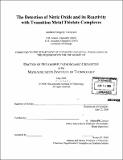The detection of nitric oxide and its reactivity with transition metal thiolate complexes
Author(s)
Tennyson, Andrew Gregory
DownloadFull printable version (24.41Mb)
Alternative title
Detection of NO and its reactivity with transition metal thiolate complexes
Other Contributors
Massachusetts Institute of Technology. Dept. of Chemistry.
Advisor
Stephen J. Lippard.
Terms of use
Metadata
Show full item recordAbstract
Nitric oxide (NO) is a molecule that is essential for life and regulates both beneficial and harmful processes. Because this gaseous radical influences many aspects of health and disease, we wish to explore the relationship between NO and physiology/pathophysiology. To this end, we seek to create tools for the fluorescent imaging of NO in vivo. We have adapted an existing small molecule-based sensor for more biologically relevant applications by including it within a polymeric film. We have also developed turn-on fluorescent sensors for NO based on conjugated polymers, which demonstrated good selectivity and sensitivity for this analyte. In addition, we have prepared a related sensor that will detect nitroxyl (HNO) but not NO. These systems demonstrate the versatility and value of the conjugated polymer scaffold for sensing applications. Many targets of the diatomic radical NO contain redox active units, such as transition metals or thiolate ligands. To gain insight into how NO might regulate biological processes by interacting with these redox active species, we have initiated a fundamental study of the reactivity of NO with transition metal thiolate model complexes. Our explorations in this field have yielded unique nickel and cobalt nitrosyl species with atypical electronic and structural parameters. These studies have suggested intermediates for the more biologically relevant iron nitrosyl complexes that have not yet been observed may exist. Furthermore, the NO chemistry of these small molecule nickel and cobalt thiolate complexes may guide future biological investigations into the regulation of nickel and cobalt metalloproteins by NO.
Description
Thesis (Ph. D.)--Massachusetts Institute of Technology, Dept. of Chemistry, 2008. Vita. Includes bibliographical references.
Date issued
2008Department
Massachusetts Institute of Technology. Department of ChemistryPublisher
Massachusetts Institute of Technology
Keywords
Chemistry.